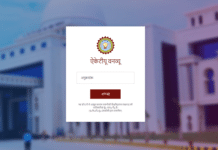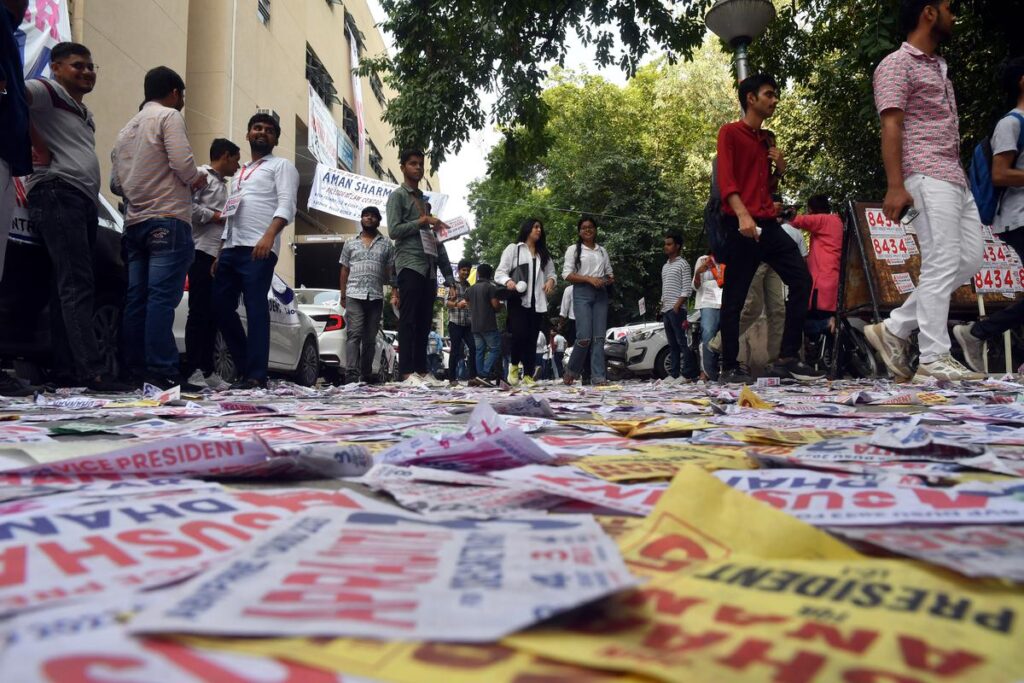The polity of India is unique in the sense that it has involved the traditions of democratic debate and discussions. Indian politics is continuously evolving During the course of the evolution of democracy, Indian politics has witnessed a wider participation of different stakeholders including the students.
The role of the youth in shaping the course of any democracy is undeniable. More than 50 percent of India’s population is below the age of 25, and more than 65 percent is below 35. Given that democracy is the will of the majority, and the majority of India’s population nearly 400 million voters is the youth, it is essential to look at the way this majority can be harnessed to participate in democracy and contribute towards the development of the country. Student politics aims to infuse democratic principles among the young generation. Even the students are willing to take political science for their undergraduate degree so that they can start learning things from the very early stages, also they read newspapers to be in touch with current life and processes.
Student Politics Scenario in India:
Students and politics have always been the core of almost all the revolutions that have taken place. Once the student starts taking an interest in the politics of his country, the change is bound to come.
• Pre-independence Scenario In India, student movements have more than 150 years of history. In 1848, Dadabhai Naroji founded the ‘Student’s Literary and Scientific Society’, as a forum for discussion. This can be considered to be the beginning of student movements in India. The first student strike happened at King Edward Medical College, Lahore, regarding academic discrimination between the English people and Indians. This strike was a complete success.
As part of the freedom struggle there were so many student movements emerged and engaged in it, The Swadeshi Movement (1905) was the beginning of the Indian Student Movement. This gave students a revolutionary outlook which called them to boycott colleges as well as British goods.
The All India College Students Conference was held at Nagpur in 1920 and the resolution on non-cooperation and boycott of schools and colleges is passed with an overwhelming majority. In addition to this, youngsters played an important role in shaping political discourse during the Civil Disobedience movement and Quit India movement
Post-independence Scenario The Independence of our nation was one of the turning points of student politics in India. There was a marked change of perspective within the leadership of the student movements. In the place of the mass student organisations, a number of local groups mostly of an ad-hoc nature developed.
Agitations have tended to be localised and forced on university issues or local political conflicts, rather than on rational or broader ideological questions.
The different student movements emerged in different states or a specified locality. The Nav Nirman Student Movement in Gujarat (1973), Bihar Student Movement (1974), Assam Student Movement (1979) and All Jharkhand Students Union (1986) are the examples of youngsters participating in political movement.
• Current Scenario Several Universities have witnessed a burst in student protests in last few years. The reason for students’ protests does vary owing to local or national issues. Student bodies like student unions give representation to the demands of students. The Jadhavpur University Protest (2014) that demanded an investigation into the molestation of a female student, and the JNU protests (2019) against fee hikes are recent examples.
Need for Youngsters in Politics:
Young people are often excluded or overlooked as political candidates. It is important to note that in the new democracies like India, the role of youth is of special importance.
Politics is typically regarded as a space for politically experienced men. Young people mainly the college student( concerned political scenario)are systematically marginalised because of their young age, limited opportunities, and projected lack of experience and with lack of money they have.However, the presence of young people in decision-making positions benefits all citizens and not just youth.
They bring a wide array of ideas. The novelty which accompanies the youth must be welcomed in politics.
Statistics explain that even if half of the governing powers come under control of sensible educated people, then a combined effort of old experienced people as well as young educated minds would increase the development rates to 40%. Not just talking about Indian politics but also matters like inter country business or maintaining relations with other nations, it is important for the youth to take participation in it as they can think above the traditional ways and easily adapt to the modern ways of development.
Student as Enablers in Politics
The purpose of an educational institution is not only to instruct the curriculum but also to produce equally responsible and aware citizens by facilitating dialectical research. Students use their political platforms, under the norms and values of democracy. Student politicians question the laws and policies, if they are against larger good of society. Further, they advocate social justice.
Furthermore, student polities help in making aware of their rights and act as a link between masses and the administration. In the past, youth leaders like Gagan Thapa, JM Namgyal and others have tirelessly fought for progressive principles such as federalism, republicanism, and inclusive democracy.
Student Politics as a Threat to Democracy:
Student groups participating in student politics are often blank in ideology and do not address the issues of national concern. The organisational structure and the activities of the student unions seem obsolete in the context of the social and political reforms in the country. Many student unions don’t reflect the inclusiveness and wider participation from all sections of the society.
Also, many times, student using the banner of a certain mainstream political party act as proxies and only push agendas relating to their ideologies, even at the cost of democratic ethos. Furthermore, many times, students engage themselves in violence and abuse.
Way Forward
Before Independence, it was repeatedly declared that youngsters must have a very acute and alert consciousness and be ready for any type of involvement to achieve freedom. After Independence, the picture seems to have changed and now it is being said that students’ main concern is academic pursuits. However, students cannot live in isolation or in a sort of social vacuum. The student agitation on various issues resonates the same. Hence, the role of youth in politics is to interpret changes in society that are beneficial to all citizens.



















